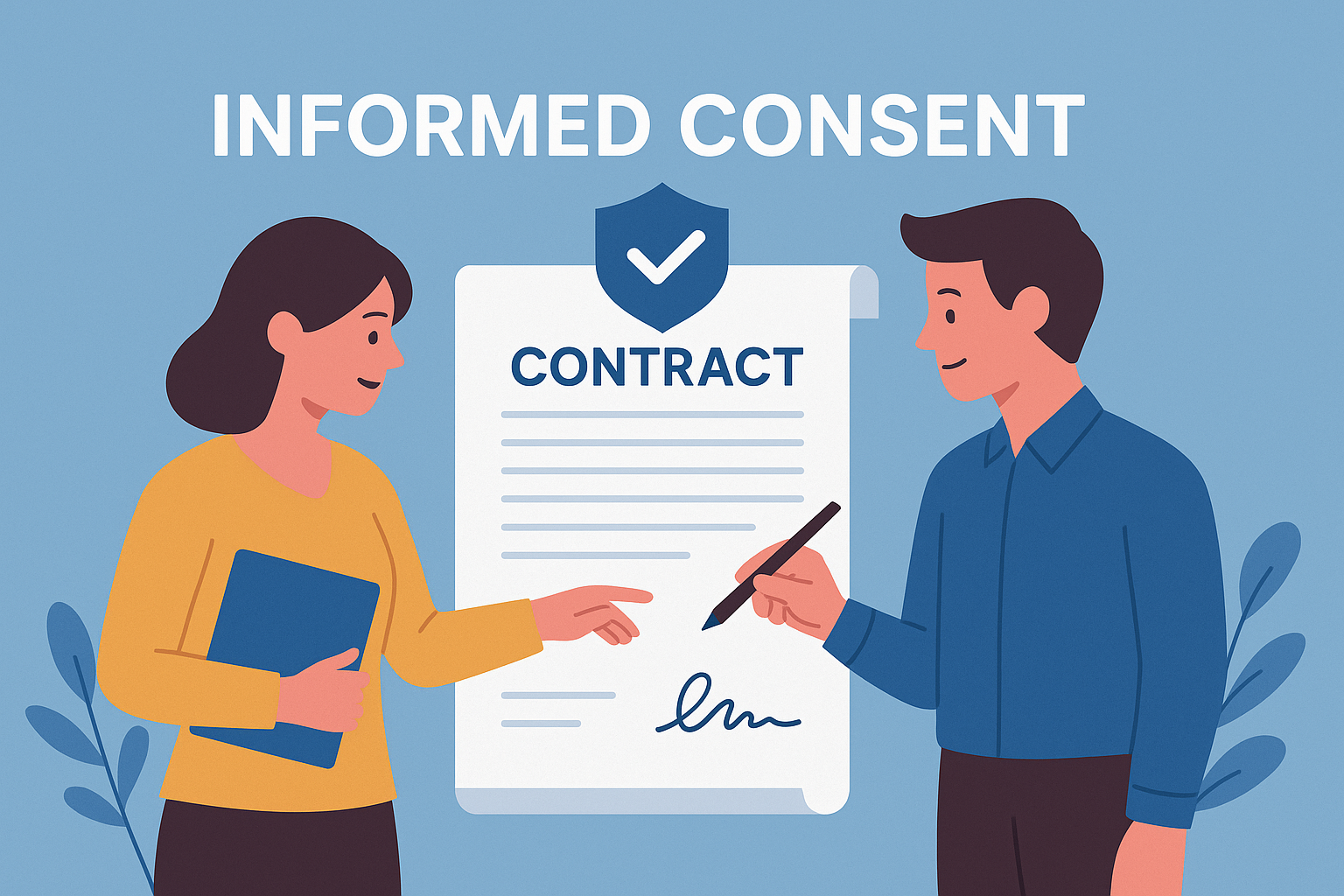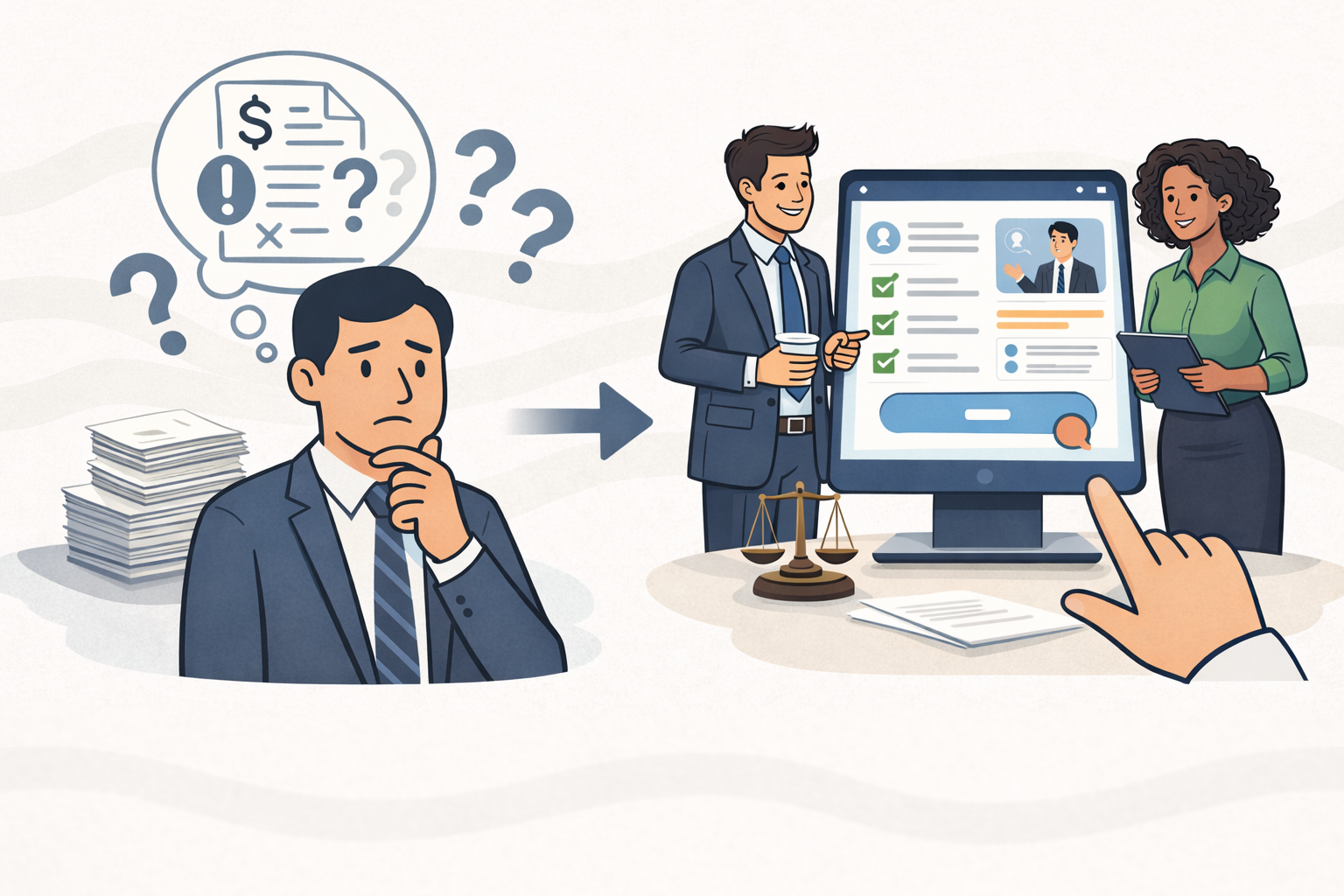Informed consent means more than a signature, it’s proof that someone has received information in a clear way, understood it, and agreed knowingly.
A signature alone only shows acceptance; it doesn’t demonstrate comprehension, which is why it’s no longer future proof in a world of rising complaints, regulatory scrutiny, and legal challenges. Businesses that rely on signatures alone risk falling short when asked to show that customers were properly informed.
At  i agree, we make informed consent simple for legal and compliance teams. Our platform delivers information in clear, digestible formats, captures evidence of understanding, and creates a stronger audit trail than signatures can provide. Any business that handles customer decisions, data, or risk needs to take informed consent seriously — because getting it right reduces disputes, lowers complaints, and keeps you ahead of regulatory expectations.
i agree, we make informed consent simple for legal and compliance teams. Our platform delivers information in clear, digestible formats, captures evidence of understanding, and creates a stronger audit trail than signatures can provide. Any business that handles customer decisions, data, or risk needs to take informed consent seriously — because getting it right reduces disputes, lowers complaints, and keeps you ahead of regulatory expectations.
Informed consent means someone knows what they are agreeing to before they agree. It is more than just clicking a button or signing a document. It is about making sure people actually understand the key points, risks, and responsibilities of an agreement.
Informed consent has long been expected in healthcare. But it is now becoming essential across many other sectors, including law, finance, insurance, real estate, and SaaS.
Why? Because misunderstandings lead to complaints, disputes, refunds, and reputational damage.

When someone gives informed consent, they have:
Seen the key terms
Understood what they mean
Had the opportunity to ask questions
Agreed with confidence
If your clients are confused, rushed, or overwhelmed by complex legal language, that is not informed consent. And that confusion often comes back as complaints, cancellations, or even regulatory trouble.
A signature shows agreement. Informed consent shows understanding.
Most people do not read contracts. They scroll to the end and click "agree" or scribble a signature without really taking it in. That might be enough to tick a legal box, but it does not mean they understood.
This creates risk for your business. A signature cannot prove someone:
Saw the important terms
Knew what they were agreeing to
Increased customer service load
Understood the implications
Informed consent goes further. It gives you confidence that the person saw and understood what mattered most. That means fewer complaints, fewer disputes, and stronger legal protection when things go wrong.
For regulated businesses, it is becoming a minimum standard. For all businesses, it is a smart way to build trust and reduce friction.

The way people give consent is changing. And so are the expectations of regulators, clients, and courts. Just capturing a signature is no longer enough to prove someone was properly informed.
Consumer protection laws are shifting. The Financial Conduct Authority (FCA), Solicitors Regulation Authority (SRA), and other regulators are making it clear: businesses must ensure that people understand what they are signing up for.
This means:
Clarity must come before consent
Important information must be easy to find and understand
You must be able to show that you gave people the chance to understand
The days of long PDFs, buried terms, and blind acceptance are ending. Signatures might tick the legal box today, but they will not hold up in a world where informed consent becomes the norm.
 i agree makes informed consent easy
i agree makes informed consent easyAt  i agree, we help you move beyond traditional signatures by making informed consent part of the process.
i agree, we help you move beyond traditional signatures by making informed consent part of the process.
Our platform helps you show that your clients:
Saw the right information at the right time
Understood what they were agreeing to
Were not misled, confused, or rushed
We do this through:
Plain English summaries that highlight key terms clearly and simply
Voice and video explainers that help people understand and remember the terms
Interaction tracking that shows exactly what was seen, clicked, and reviewed
Layered content so users can go deeper into the details when they choose
This is not about replacing your existing contracts. It is about making them more understandable, more transparent, and more defensible.
It is how you create agreements that work for everyone — not just your legal team.
Informed consent is not just for doctors. Any business that wants to reduce complaints, avoid disputes, or improve customer experience can benefit from it.
It is especially important if you:
Work in a regulated industry like finance, legal services, or insurance
Rely on contracts that are long, complex, or full of fine print
Handle large transactions, ongoing services, or subscription agreements
Want to improve trust and transparency with your clients
If you have ever heard a customer say, "I didn’t realise that’s what I agreed to", then informed consent is the answer.
Build trust before it breaks
More complaints are being made. More claims are being challenged. And more businesses are being held to higher standards when it comes to client communication.
Getting ahead of these changes is not just about avoiding risk. It is about creating better client experiences and stronger relationships.
Informed consent is not a checkbox. It is a mindset. And when you adopt it, you create agreements that are easier to understand, easier to trust, and easier to stand behind.
 i agree helps you deliver that experience, without slowing things down.
i agree helps you deliver that experience, without slowing things down.
Informed consent means someone clearly understands the content, risks, and responsibilities of a contract before agreeing. It goes beyond signatures to focus on true understanding.
A signature shows agreement, but not understanding. People often sign without reading. Informed consent provides proof that key terms were seen and understood.
Platforms like  i agree use summaries, videos, and tracking to show what someone saw and when. This creates a digital audit trail that goes far beyond a traditional e-signature.
i agree use summaries, videos, and tracking to show what someone saw and when. This creates a digital audit trail that goes far beyond a traditional e-signature.
Signatures do not prove that someone read or understood the important parts of a contract. With increasing regulation and consumer expectations, businesses need to prove more than just acceptance.
Informed consent is essential in legal, financial, insurance, healthcare, and SaaS sectors — or any business where unclear terms can lead to complaints or legal exposure.
In many industries, yes. Even where it is not legally required, it is becoming a best practice for protecting your business and improving client satisfaction.
If you have more questions, take a look at our full FAQs page where we cover a wider range of topics in more detail. It’s a quick way to find answers and explore other subjects that might be useful to you.


